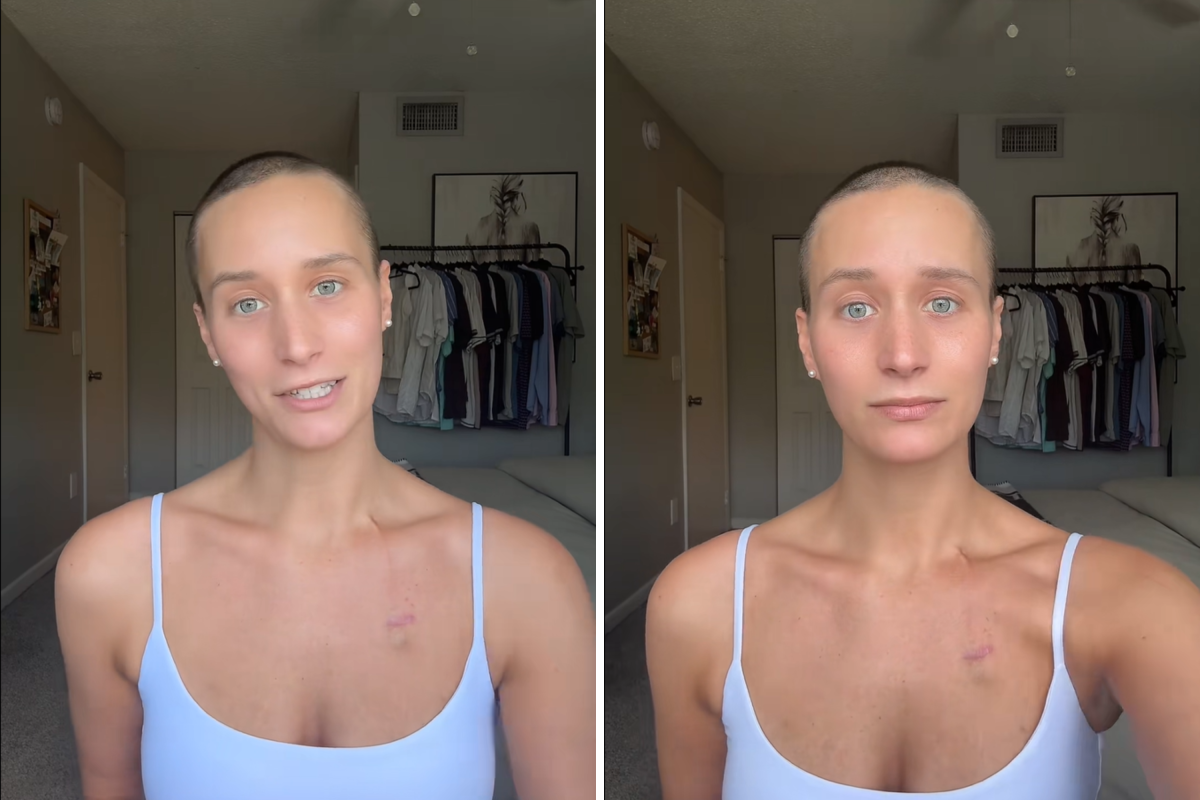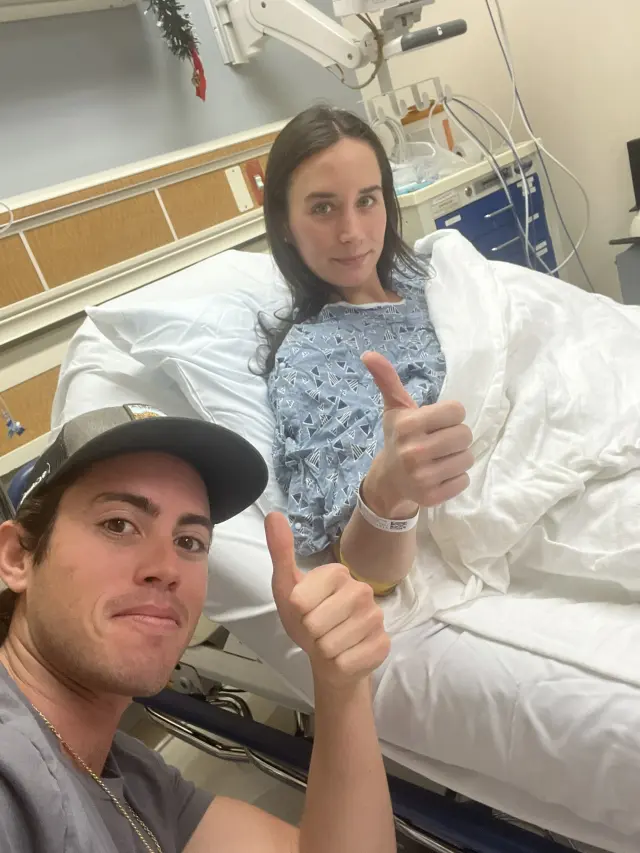
In hindsight, my symptoms started in September 2024. I was so tired—just completely exhausted. I was 22, working full-time on the operations team for a company that managed boat shows. I was a workaholic; that’s what fueled me. I was super healthy and worked out regularly. I told myself, “My job is really demanding right now. That’s why I’m tired. That’s why I’m not feeling like myself.”
I had really bad itching—specifically my shoulders were really itchy, to the point where I would cry and scratch my skin until it bled. I’ve always had sensitive skin, so when I started itching profusely, I thought, “Something I’m using is giving me this reaction.” I started ruling out all my skincare products, my laundry detergent. I cut out foods. When it started getting cold outside, I said, “It’s the weather that’s drying out my skin.” I brushed it aside.
Then my world flipped upside down in the blink of an eye.
On Thanksgiving, my boyfriend and I were at my family’s home in Tampa. I noticed a lump on the left side of my collarbone region. I asked my mom and my boyfriend, “Is this something to be concerned about?” We decided collectively that it wasn’t a big deal, but I should make an appointment with my dermatologist. The first appointment I could take was in January. I never made it there.
On Dec. 19, I called my mom crying. I was in so much pain and I didn’t know what was wrong with me. My pain was in my neck and upper back. I couldn’t sleep. The next morning, as I was driving to work, I called my mom again, bawling. “Something is wrong,” I said. My intuition has always been so strong. There was this lingering thought I couldn’t get rid of: Bring yourself to the hospital. It kept circling in the back of my mind. I couldn’t shake this feeling that I needed to go to the emergency room. I wasn’t thinking: Do I have cancer? Am I just sick? Did I pull a muscle? I wasn’t thinking any of that. It was just: Go. Bring yourself in. Go. I had to trust my gut.
I checked myself in. The doctors weren’t sure if I had muscle spasms or arthritis. I had X-rays done, and the doctors could see distorted tissue below my neck, leading into my collarbone and chest and ribcage area. They sent me for CT scans. Then two oncologists came into the room and said they were going to admit me overnight. My heart sank because my birthday was the next day. I was terrified. They let me go the next night, but I returned two days later for a biopsy on my neck and collarbone region. It turned out that the pain I was experiencing was from an enlarged lymph node. A few days later, the results of the biopsy came back: It was cancerous. I had a PET scan done and then, on New Year’s Eve, I found out I had stage 2 Hodgkin lymphoma.
I didn’t have time to think about anything. It was go-go-go. I froze my eggs. At the end of January, I began chemotherapy. I started working remotely. It was a very isolating experience. I was always the youngest person in the infusion room. I was terrified, but I also knew I was going to be OK. I finished chemo in May, then got the news that I was in remission on June 2. It was very quick and very sudden.

I didn’t shave my head until after I was done with chemo. I had beautiful, long brown hair. It was a huge part of my identity. It made me feel like me. It made me feel beautiful. It made me feel feminine. And I didn’t want to let that go. I tried to do the cold capping to save my hair, but because of the drug makeup I was on for my chemotherapy, it began to fall out. At first, it was very slow. Then, all of a sudden, around the halfway mark during treatment, it really started coming out. I chopped my hair to a bob, thinking maybe I could salvage it that way. Then one day I cracked. I woke up one morning and my hair had fallen out so much in chunks that I had bald spots. I felt so out of touch with who I was. I went to the hair salon and shaved it off. I didn’t tell my mom or my boyfriend or my sisters. It was impulsive. I didn’t think about it. That was probably the most freeing moment for me. I thought, “Did I really do this?” But there’s no going back. I had to ask myself, “How do I pick the pieces of myself up and start feeling like myself again?”
That’s when I pulled out my phone and started talking. I began sharing about my cancer journey on TikTok. I thought to myself, “There have to be other people who have gone through this, who feel the exact way I do. What do I have to lose?” It’s truly changed everything for me. I’ve connected with other women who have gone through cancer at a young age, and now I talk to them on a regular basis.

I’m in remission now. I thought everything was going to go back to normal, but it didn’t—that’s been the hardest part to overcome. I’ve had to work on my strength. Nobody warned me about “chemo brain,” and I was frustrated with myself: Why can’t I remember anything? Why am I not performing as well at work? I’m not sick anymore, so what’s wrong with me? I took short-term disability leave. I’ve had to work through anxiety. Social settings are really hard for me, because I’m thinking, “Where’s that person been? Am I going to get sick being around all these people?” and also, “Is everyone looking at me?” I worry that everyone is thinking, “This girl has short hair—what is wrong with her?” I have to constantly remind myself that I’m trying my best. I’m doing what I can, and I can’t worry about the rest. I still have anxiety, but I’m choosing to be the most authentic version of myself. If I don’t feel good, then I don’t feel good, and that’s OK. But if I feel good, let’s appreciate it and do something. It’s all up and down.
It’s been almost a year since my diagnosis. It’s changed everything. I want young women to know that they should always trust their gut. Advocate for yourself if you think something is wrong with you, especially if it’s out of the ordinary. Go after it and don’t stop until you figure out the root cause.
This interview has been edited and condensed.
Do you have a personal essay you want to share with Newsweek? Send your story to MyTurn@newsweek.com.
